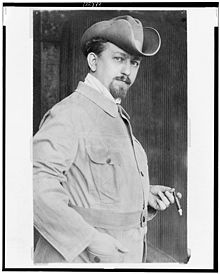Leo Frobenius
Leo Viktor Frobenius (29 June 1873 - 9 August 1938) was an ethnologist and archaeologist and a major figure in German ethnography. He was born in Berlin as the son of a Prussian officer and died in Biganzolo, Lago Maggiore, Piedmont, Italy. He undertook his first expedition to Africa in 1904 to the Kasai district in Congo. Until 1918 he travelled in the western and central Sudan, and in northern and northeastern Africa. In 1920 he founded the Institute for Cultural Morphology in Munich. In 1932 he became honorary professor at the University of Frankfurt, and in 1935 director of the municipal ethnographic museum.
In 1897/1898 Frobenius defined several "culture areas" (Kulturkreise), cultures showing similar traits that have been spread by diffusion or invasion. With his term paideuma, Frobenius wanted to describe a Gestalt, a manner of creating meaning (Sinnstiftung), that was typical of certain economic structures. Thus, the Frankfurt cultural morphologists tried to reconstruct "the" world-view of hunters, early planters, and megalith-builders or sacred kings. This concept of culture as a living organism was influenced by the theories of Oswald Spengler.
Frobenius taught at the University of Frankfurt. In 1925, the city acquired his collection of about 4700 prehistorical African stone paintings, which are currently at the University's institute of ethnology, which was named the Frobenius Institute in his honour in 1946.
His writings with Douglas Fox were a channel through which some African traditional storytelling and epic entered European literature. This applies in particular to Gassire's lute, an epic from West Africa which Frobenius had encountered in Mali. Ezra Pound corresponded with Frobenius from the 1920s, initially on economic topics. The story made its way into Pound's Cantos through this connection.
In the 1930s, Frobenius claimed that he had found proof of the existence of the lost continent of Atlantis.[1]
Due to his studies in African history, Frobenius is a figure of renown in many African countries even today. In particular, he influenced Léopold Sédar Senghor, one of the founders of Négritude, who once claimed that Frobenius had "given Africa back its dignity and identity." Aimé Césaire also quoted Frobenius as praising African people as being "civilized to the marrow of their bones", as opposed to the degrading vision encouraged by colonial propaganda.
Works
- Die Geheimbünde Afrikas (Hamburg 1894)
- Der westafrikanische Kulturkreis. Petermanns Mitteilungen 43/44, 1897/98
- Weltgeschichte des Krieges (Hannover 1903)
- Unter den unsträflichen Athiopen (Berlin 1913)
- Paideuma (Münich 1921)
- Dokumente zur Kulturphysiognomik. Vom Kulturreich des Festlandes (Berlin 1923)
- Erythräa. Länder und Zeiten des heiligen Königsmords (Berlin 1931)
- Kulturgeschichte Afrikas (Zürich 1933)
External link
Credits
New World Encyclopedia writers and editors rewrote and completed the Wikipedia article in accordance with New World Encyclopedia standards. This article abides by terms of the Creative Commons CC-by-sa 3.0 License (CC-by-sa), which may be used and disseminated with proper attribution. Credit is due under the terms of this license that can reference both the New World Encyclopedia contributors and the selfless volunteer contributors of the Wikimedia Foundation. To cite this article click here for a list of acceptable citing formats.The history of earlier contributions by wikipedians is accessible to researchers here:
The history of this article since it was imported to New World Encyclopedia:
Note: Some restrictions may apply to use of individual images which are separately licensed.
- ↑ "Leo Frobenius", Encyclopedia Brittanica, 1960 edition
